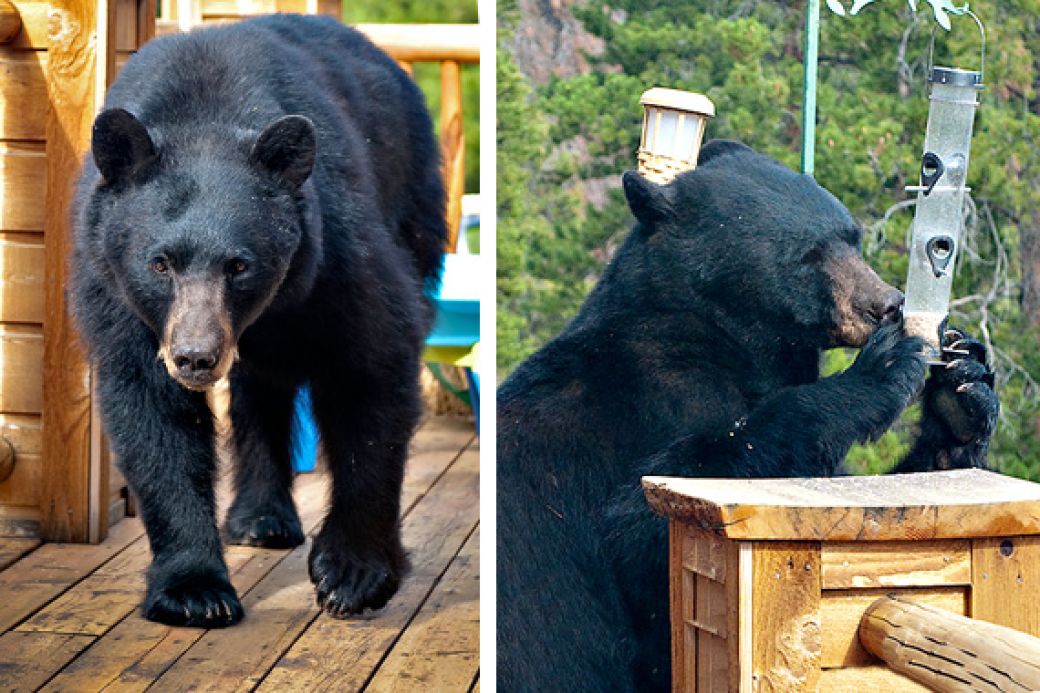Ever had a bear try to claw its way into your house?
Kara Jackson has. The Forest Falls, Calif., youngster was home alone one afternoon when a bear tried to climb in through an open kitchen window. Kara knew what to do, however, and made enough noise to startle the bear and chase it away.
It was the family’s third bear encounter in a month.
Although you might not live in bear country like the Jacksons do, millions of Americans live in rural areas or have vacation homes where bears roam. A thrilling sight in the wild, a bear is less than charming when it’s trying to stick its nose in your refrigerator.
Keeping bears out of your household has a lot to do with common sense. Here’s what you need to know:
Eliminating Enticing Odors
Bears have excellent sniffers. Your first line of defense is to make sure they’re not attracted to your property because you left foodstuffs outside.
Bird feeders: Regularly clean up debris beneath bird feeders. Put away your bird feeders in early spring (April 1) and don’t put them back up until mid-November. Bring hummingbird feeders in at night.
Pet food: Feed pets indoors when possible, and store pet food indoors. If you feed animals outdoors, bring food dishes in at night.
Garbage: Put garbage out shortly before pickup time. Store garbage in a bear-resistant trash container or inside a storage area. Double-bag to reduce odors and place bags inside the container. Regularly clean and deodorize cans with bleach.
Grills: When cooking meat on the outdoor grill, don’t leave your food unattended. Thoroughly clean your grill after use, including the grease can and drip tray. Clean up spills on your deck or patio. Store the grill in a garage or shed when not in use.
Compost: Don’t add pungent items such as meat, melon rinds, or sweet-smelling foods to your compost pile. Regularly turn the pile and add lime to reduce odors.
Fruit trees and berry bushes: Harvest fruit from fruit trees and berry bushes as soon as it's ripe. Pick up fallen produce frequently; rethink planting more fruit trees or berry bushes.
Beehives: Protect beehives with electric fencing.
Other: Even non-food items can attract bears. Take scented items, such as suntan lotion, insect repellent, soap, or candles indoors when not in use.
Preventing Home Invasions
During spring and fall, when bears are roaming around seeking food, or when a bear is reported in your area, close and lock windows and doors at all times. (Scents wafting from your home can lure bears inside.) Here are other ways to prevent bears from entering your yard, home, and garage.
Electric fencing: Install electric fencing around your yard or around fruit trees and gardens. Electric fencing gives bears a shock, but doesn’t harm them.
You'll need an energy source (either a 12-volt marine battery or 110-volt household current), plus an energizer, fence posts, a grounding rod, and 14- or 12-gauge, hi-tensile galvanized steel wire. The largest expense is the energizer, a device that delivers the electrical pulse to the wire fence. Look for a charger that offers a minimum of .7 joules to effectively shock a bear.
A heavy-duty electric fencing kit that covers a 50-by-50-foot area costs about $1,100.
Bars/grilles on windows: Bears can easily push through screens and glass windows; steel grilles and bars — called burglar bars — are good deterrents. A burglar bar with a quick release mechanism for emergency egress is $200-$250 for a 42-by-54-inch window.
Deterrents: Install and use specially designed animal deterrents to discourage bears from entering your property.
Infrared motion detector water sprays are design to humanely scare off all kinds of animals, including bears. Hook them to your garden hose or irrigation system. $50-$90
Motion-activated sound systems simulate a barking dog. Some types are radar-activated, meaning they can detect motion behind solid objects, such as fences. $60-$90.
Motion-sensor lighting helps startle any kind of intruder — man or animal. $25-$100.
Related: Outdoor Lighting for Safety and Curb Appeal
For a passive deterrent, liberally apply pine-scented cleaner around doors, window frames, and porch steps.
Crawl spaces: Securely block access to potential hibernation sites such as crawl spaces under decks and buildings.
What To Do When You’re Away
If your away from your house for an extended period of time, or you’re closing a vacation cabin for the season, be sure to clean out all foodstuffs from shelves, refrigerators, freezers, and pantries. Also:
- Sweep up any crumbs and debris, and remove all trash.
- Protect windows with heavy shutters. The Alaska Dept. of Fish and Game recommends custom-cut panels of ¾-inch plywood secured with hanger bolts.
- Don’t store food, such as dry pet food, anywhere in your house or garage. Remove it until you return.
Close Encounters: What To Do
Always be ready for an encounter with a bear in bear country and carry pepper spray. Use it only in the event of an attack. Black bears likely will run when you make noise by clapping, yelling, banging pots and pans, or blowing a boat air horn.
However, if you encounter a grizzly, remain quiet and back slowly away. Be certain you know the difference between a black bear and grizzly.
